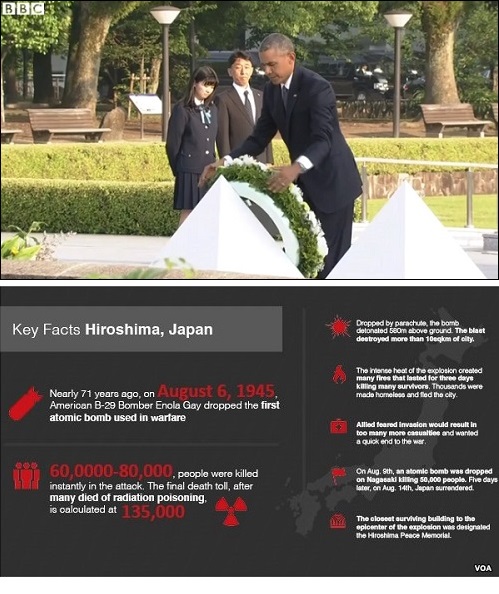
|
|

|
|
| April 19, 2024 |
|
Obama makes history, confronts past in Hiroshima 
Honoring the memory of victims of the atomic bomb that fell on Hiroshima seven decades ago, U.S. President Barack Obama said the world has a shared responsibility to prevent the suffering that took place in the Japanese city from happening again.
"We stand here in the middle of this city and force ourselves to imagine the moment the bomb fell," Obama said Friday at Hiroshima's Memorial Peace Park. "We force ourselves to feel the dread of children confused by what they see. We listen to silent cry. We remember all the innocents killed across that arc of terrible war and wars that came before and wars that would follow.” Obama and Japanese Prime Minister Shinzo Abe made history simply by walking through the memorial park together. An American warplane dropped the world's first atomic bomb on Hiroshima on August 6, 1945 during the waning days of World War II, killing tens of thousands and subjecting a generation to radiation sickness. Obama is the first sitting U.S. president to visit the city. "We come to mourn the dead," the U.S. leader said after he and Abe each placed a wreath at the Peace Memorial. "We have a shared responsibility to look directly in the eye of history. We must ask what we must do differently to curb such suffering again," a solemn Obama said. "We must re-imagine our connection to one another as members of the human race." Obama also called for a moral awakening in regards to nuclear weapons. “The world was forever changed here. But today the children of this city will go through their day in peace. What a precious thing that is. It is worth protecting and then extending to every child. That is a future we can choose. A future in which Hiroshima and Nagasaki are known not as the dawn of atomic warfare, but as the start of our own moral awakening,” he said. The two leaders stood side by side in front of the arch-shaped Memorial Cenotaph, a symbol of an empty tomb. Carved into the structure are the words: “Rest in peace, for the error shall not be repeated.” The Japanese peace park does not define the “error” in question, whether it refers to the U.S. bombings or the Japanese aggression and Second World War that preceded them; stubborn questions that are still answered differently in each country. But as the two leaders laid wreaths at the empty tomb, they made clear their intent was not to litigate the past, but to promote healing, and to issue a strong warning against any use of nuclear weapons in the future. After his remarks, the U.S. leader greeted two Hiroshima survivors attending the ceremony; 91-year-old Sunao Tsuboi, the Chairman of the Hiroshima Prefectural Confederation of A-bomb Sufferers Organization; and Shigeaki Mori, who created a memorial for American World War II prisoners of war killed at Hiroshima. No apologies Abe did not seek an apology from Obama for the U.S. decision to drop atomic bombs on Hiroshima and Nagasaki, and he did not get one. Even some of the few remaining Japanese survivors of the bombs said it was enough for them that a sitting U.S. president finally came. Ahead of the visit, White House Press Secretary Josh Earnest said, “What I think the president does appreciate is that President [Harry] Truman made this decision for the right reason.” But Earnest said the United States does have a “special responsibility” as the only country to have ever used an atomic bomb to work tirelessly for nuclear non-proliferation. Why US bombed Japan It was nearly 71 years ago when a mushroom-shaped cloud lit up the sky over Hiroshima, and three days later over Nagasaki. About 140,000 people in the two cities died within the year, and survivors and their children have faced untold suffering due to radiation poisoning. The U.S. rationale for the decision was to bring years of Japanese aggression to a quick end, potentially saving many more lives than would have been lost in a U.S. invasion. But many Japanese see it differently, saying innocent men, women and children were unnecessarily incinerated and poisoned. How US veterans feel about visit A number of veterans’ groups and many older Americans opposed Obama’s visit to Hiroshima. Reconciliation with former war time enemies seemed to be the common thread of what will likely be Obama’s last tour of Asia as president, with visits to Vietnam and Japan. In Vietnam, the president lifted a 50-year-old arms embargo and had an intensely personal exchange with young Vietnamese leaders at a town hall, telling them to pursue their passions. The president is now headed back to Washington. (Source: VOA News) Story Date: May 29, 2016
|